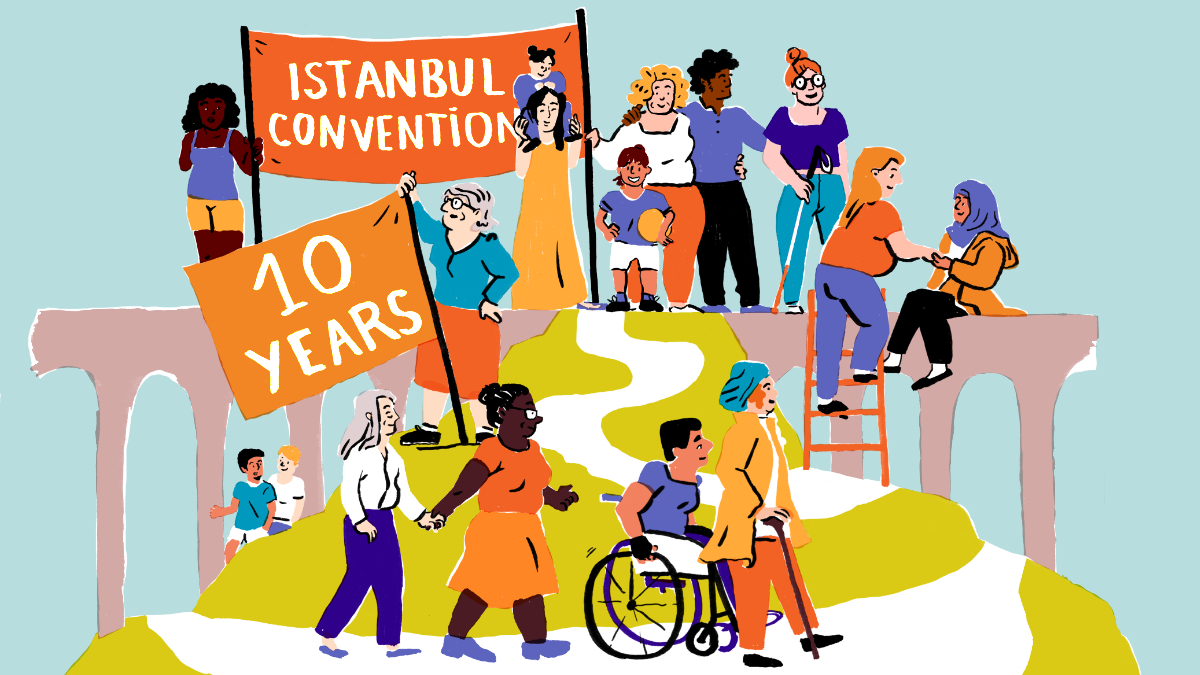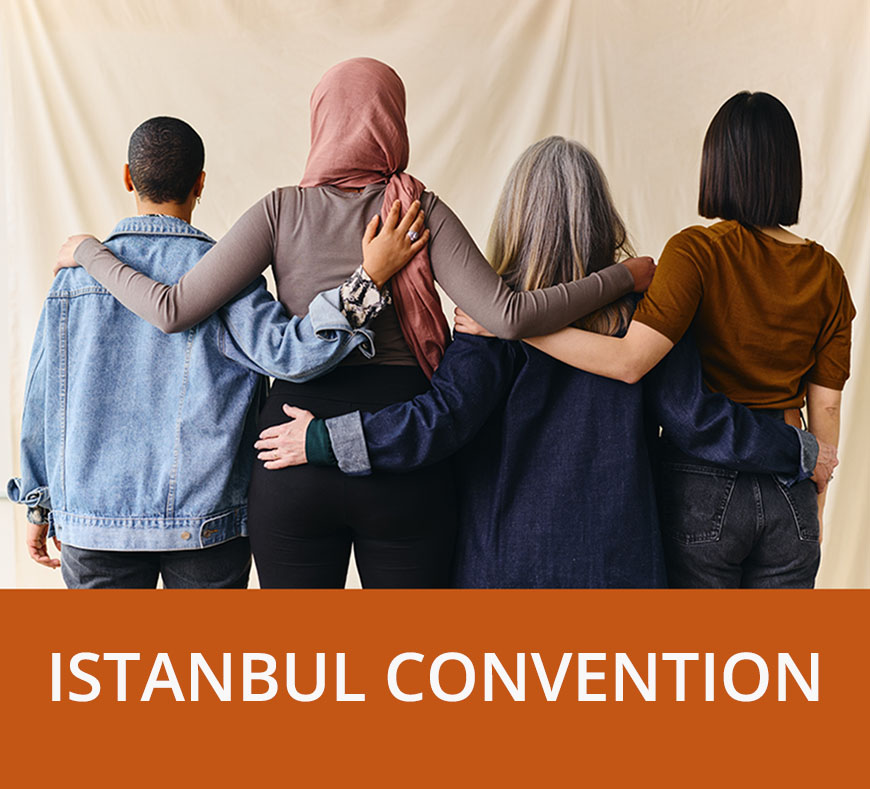Joining forces: Civil society and international co-operation

The advancement of women’s right to be free from violence requires joint efforts and commitment at international, European and national level. As a major European treaty aimed to reach this objective, the Istanbul Convention provides opportunities to bring all relevant actors together, including international organisations, national decision-makers, civil-society organisations and NGOs.
 Getting involved: NGOs and civil society as partners in advancing the Istanbul Convention
Getting involved: NGOs and civil society as partners in advancing the Istanbul Convention
NGOs and civil society organisations active in preventing and combating violence against women are key actors in the implementation of the Istanbul Convention. Therefore, national governments who ratify the convention have a legal obligation to recognise, encourage and support their work and to establish effective co-operation with them. This obligation is stated in Article 9 of the Istanbul Convention. In its baseline evaluation procedure, GREVIO assesses to what extent this is being done and where it sees room for improvement. An overview of GREVIO’s findings, including in relation to measures taken by 17 national governments to recognise and to support the work of NGOs in the field of violence against women, will be available soon in the horizontal review of all GREVIO baseline evaluation reports.
 Reporting: Civil society contributions to the monitoring of the Istanbul Convention
Reporting: Civil society contributions to the monitoring of the Istanbul Convention
NGOs and civil society organisations are also major partners in monitoring the implementation of the Istanbul Convention in practice. GREVIO, the independent expert monitoring body established by the convention, recognises the important role which NGOs and civil society actors play in this field. It made it clear in its Rules of Procedure (Rule 35) that NGOs and other members of civil society are vital sources of information and that their input will be treated as confidential by GREVIO. They are therefore strongly encouraged to contribute at any time.
When starting its first baseline evaluation of a particular country on the basis of its questionnaire, GREVIO will, whenever possible, invite NGOs and civil society organisations working in that country to provide relevant information. To date, around 70 NGOs and civil society organisations, including national human rights institutions, have made use of this possibility.
GREVIO also carries out evaluation visits to all countries party to the convention in order to make a more thorough assessment of the situation on the ground. During these visits, its delegation will hold meetings with NGO and civil society representatives. In addition, GREVIO may consider using further means of evaluation, such as organising hearings for NGOs and civil society.
A special section of the convention’s website provides information to NGOs and civil society actors interested in contributing to GREVIO’s monitoring.
 Being vocal: Campaigning and advocacy around the Istanbul Convention
Being vocal: Campaigning and advocacy around the Istanbul Convention
In addition to (shadow/alternative) reporting, many NGOs and civil society organisations are spearheading independent advocacy efforts around the Istanbul Convention. Campaigning to raise awareness of its objectives and lobbying for its ratification are vital in ensuring the Istanbul Convention’s full implementation. In this regard, the Conference of INGOs of the Council of Europe adopted on 15 October 2020 a recommendation, calling on governments to strengthen and renew their commitment to ending violence against women and not to reject international treaties designed to protect women and hold perpetrators responsible.
In addition, many civil society organisations and NGOs have carried out national, multi-country or European campaigns in support of the Istanbul Convention. The following examples give an impression of the various initiatives taken without offering an exhaustive list.
Examples of on-going campaigns:
- We Move Europe: Rise up against violence! is a petition urging European leaders and the EU to ensure the right of women and girls to be free from violence by ratifying the Istanbul Convention.
- Inclusion Europe: Violence against women with intellectual disabilities aims to raise awareness about the fact that women with disabilities experience violence at significantly higher rates than women without disabilities. It offers an easyto-read guide on the Istanbul Convention.
- Work With Perpetrators: the website Support to the Istanbul Convention encourages domestic violence perpetrator programmes to promote, follow and monitor the implementation of the Istanbul Convention in their countries.
- WAVE (to be published soon)
- Conversations on Consent is a multicountry campaign that aims at raising awareness and encouraging policy changes around the issue of consent on the basis of Article 36 of the Istanbul Convention. It will be launched shortly.
- IC Change UK: IC an end to violence against women, is a volunteerled campaign calling on the UK Government to ratify the Istanbul Convention.
Examples of past campaigns:
- In support of the 16 Days of Activism against GenderBased Violence 2020, the Diocese in Europe uploaded a YouTube video advocating for the ratification of the Istanbul Convention.
- The European Women’s Lobby "Act against rape! Use the Istanbul Convention!" campaign, promoted the adoption of the Istanbul Convention as a concrete tool for change to eradicate all forms of male violence against women, specifically rape.
- The EuroMed Rights Convention to prevent and fight violence campaign, aimed to raise awareness among NGOs and the public opinion on the Istanbul Convention.
- The WAVE Step up campaign called on states to sign, ratify and implement the Istanbul Convention to ensure that women and girls can live a life free from violence.
- The 2020 D.i.Re campaign "Violence against women. What state are we in?” aimed to provide an overview of and raise awareness among the public, the media and the institutions of the findings put forward by GREVIO in its Baseline Evaluation Report on Italy, published on 13 January 2020, urging the Italian Government to fully implement the Istanbul Convention
 Creating synergies: International and European co-operation
Creating synergies: International and European co-operation
The promotion of international co-operation with a view to eliminating violence against women and domestic violence is one of the purposes of the Istanbul Convention (Article 1). Co-operation among state parties to the convention, among the stakeholders relevant for the treaty’s implementation, among institutions and entities at global and European level and with parliamentarians and civil society is key in ensuring ratification and implementation of the convention. To date, many institutions, entities and organisations have rallied around the Istanbul Convention and the advancement of women’s rights more globally, and initiatives taken in one party are inspiring action in other parties to the Istanbul Convention. The convention is serving as a platform for exchange at European level, and through GREVIO’s interaction with other monitoring bodies, the trends and challenges in its implementation are gaining visibility at international level.
Dialogue among monitoring mechanisms on women’s rights and violence against women
Since 2018, the seven regional and global independent monitoring mechanisms on women’s rights and violence against women form the Platform of Independent Expert Mechanisms on Discrimination and Violence against Women (EDVAW) which helps to identify global challenges and to reflect on common solutions to advance women’s rights, including by addressing violence against women. Through regular exchanges, the EDVAW Platform aims to strengthen institutional links and thematic co-operation between the mechanisms with a view to working towards harmonised strategies and undertaking joint action. Such action, which GREVIO plays a strong role in, includes joint statements and the organising of high-level panels during the Commission on the Status of Women (CSW) as well as demonstrating their contribution to global women’s rights documents such as the Beijing Platform for Action.
A role for Parliamentarians
One of the major innovations of the convention is the obligation placed on national governments to invite their parliaments to participate in the monitoring process and to submit GREVIO’s evaluation reports to them. The Istanbul Convention also foresees a significant role for the Parliamentary Assembly of the Council of Europe, which is invited to take stock of the implementation of the convention at regular intervals. Parliamentarians also have an important role to play in supporting ratification. The Parliamentary Network Women Free from Violence brings together parliamentarians from the national delegations to the Parliamentary Assembly of the Council of Europe and observers and partners for democracy. It provides a vital parliamentary forum for the Council of Europe’s work to end gender-based violence. Additional information on the role of parliamentarians can be found in the handbook for parliamentarians on the Istanbul Convention.
Co-operation projects with national authorities
The Council of Europe implements capacity building and co-operation projects on gender equality and combating violence against women and domestic violence in order to provide national authorities with information, tools and expertise necessary to comply with relevant standards in these fields, including with the case law of the European Court of Human Rights. These projects contribute towards making gender equality a reality in both the member states and within the Organisation.
European exchange among state agencies co-ordinating measures on violence against women
At European level, meetings among government bodies designated to co-ordinate all national measures on violence against women provide opportunities for the exchange on lessons learned and promising practices. To facilitate such exchanges, a meeting among national co-ordinating bodies set up under Article 10 of the Istanbul Convention will be organised on 14 October 2021 in Finland. These are official bodies mandated with four specific tasks: co-ordinating, implementing, monitoring and evaluating the policies and measures devised to prevent and combat violence against women and domestic violence. The creation of such “national co-ordinating bodies” aims at ensuring that the various measures taken to put the convention into practice are well co-ordinated and part of a concerted effort of all sectors of government. The upcoming meeting of all national co-ordinating bodies will facilitate exchanges around best practices and challenges in the national implementation of the Istanbul Convention.




